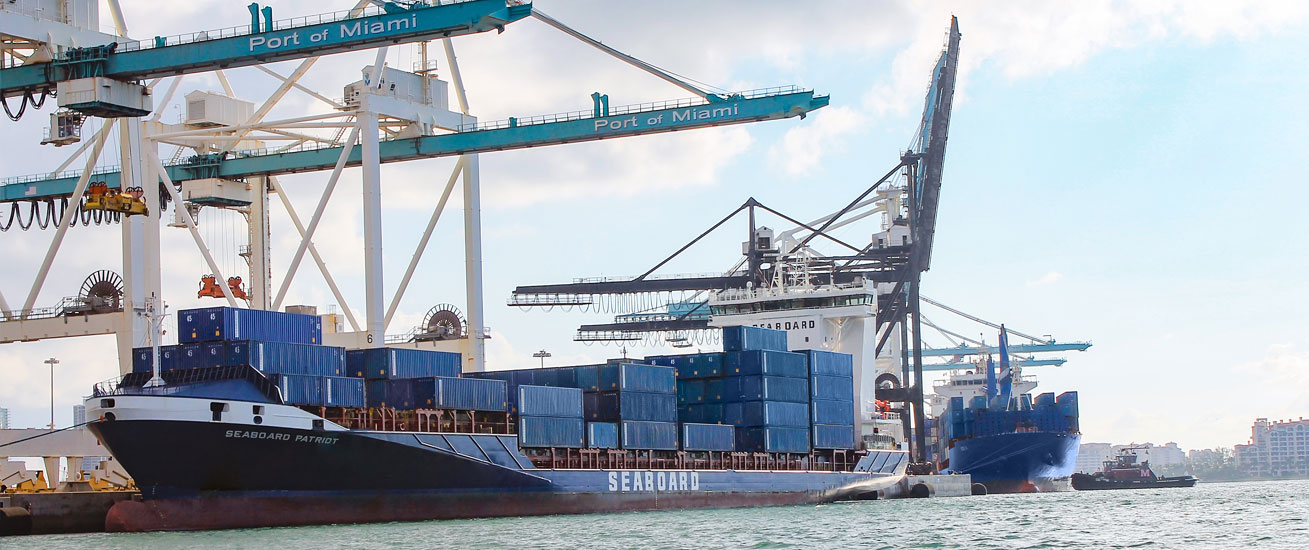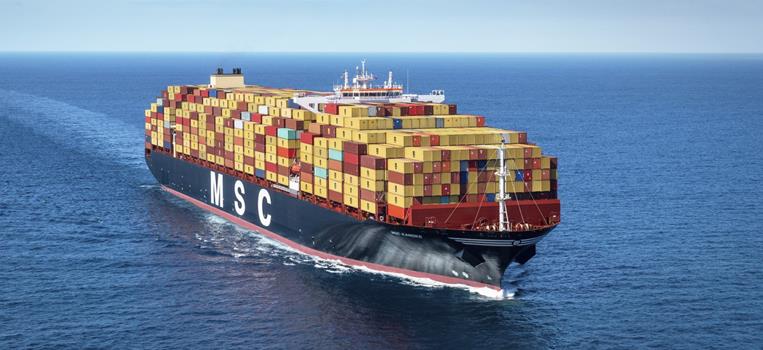Seaboard Marine COVID-19 message
For nearly 40 years, Seaboard Marine has served the Western Hemisphere carrying cargo to some of the world’s hardest-hit countries in the aftermath of natural disasters. But, no situation has come close to the recent pandemic affecting nearly every country on earth. This extraordinary epidemic has tested the limits of our business continuity protocols. The urgency of this situation has also strengthened our partnerships with federal and local governments as well as our most loyal customers who import and export critical commodities that help fight the spread of the novel coronavirus COVID-19.
Since the spread of the virus, Seaboard Marine has been working with various seaport and government officials, both within the U.S. and abroad, to ensure we can continue to operate as an essential service while making necessary adjustments to ensure the expeditious transport of cargo and supplies. Many of our customers throughout the United States and Latin America contribute tremendously to meeting the need for critical products such as medical supplies, pharmaceuticals, and food.

One of those customers is DeRoyal, a manufacturer of medical supplies, with facilities throughout the U.S., as well as manufacturing plants in Costa Rica, Dominican Republic, and Guatemala. Elizabeth Reed, Sr. Director of Quality and Regulatory at DeRoyal, said, “It is imperative that we strive to ensure the supply of critical materials for medical products. Disruption of the medical supply chain would be catastrophic. During these outbreaks, the demand for medical devices increases in a short period of time. We are committed to sustaining our product offerings during this outbreak.”
Maggie Martinez, Vice President of Sales at Seaboard Marine, said, “We are committed to partnering with our many valued customers who make medical supplies and apparel for medical use, such as DeRoyal, SanMar, Parkdale and Hanesbrands, to ensure our vessels are providing reliable service, especially in these critical times. Their crucial supply chains operate best when we understand their needs while adjusting to changing curfews, stay-at-home orders, and other challenges in the communities in which we serve.
Governments throughout Latin America and the Caribbean, like their counterparts in the U.S. and elsewhere in the world, have recently placed varying limits on mobility and certain types of work. Most, though, have recognized the importance of international trade, particularly essential commodities. Nonetheless, it has been challenging, at times, to meet the transportation needs of our customer’s factories. But all of the offices within the Seaboard network including those overseas are ensuring that cargo containers, trucks, and needed local paperwork are provided, so the urgently manufactured masks and gowns are promptly delivered via Seaboard Marine ships for quick transit to the U.S.
Martinez added, “Our vessels and ports are major components, but another key component is intermodal services necessary to complete end-to-end distribution, especially due to specific surges like now. This vital factor of the supply chain requires a dedicated overland transportation network not just in the U.S., but overseas too. Through listening to our customers and having a strong sense of the environment in each and every country, which is changing daily during the crisis, we’re able to provide the needed seamless connectivity between ocean and land or vice versa.”
Reed added, “Seaboard Marine is a critical transportation service supplier of raw materials to DeRoyal for manufacturing of medical products. These medical products are sold directly to hospitals, trauma centers, group purchasing organizations, and physician offices. DeRoyal depends on Seaboard Marine to continuously transport containers with material to enable us to actively sustain our global supply of finished medical products.”
In addition to threatening lives, this pandemic has interrupted the normal order of society. However, not all dissimilar to a natural disaster, business continuity is in our blood, and we are always prepared in advance. With over 90% of our office-based staff now working remotely while also keeping our cargo terminals and vessels operating at a high standard, we work with our customers to use our combined assets and infrastructure to urgently fight against the spread of the virus, case in point SanMar.
Seattle-based SanMar is an award-winning supplier of apparel and accessories to 22 retail, private label, and mill brands. John Janson, Global Logistics Director at SanMar, said, “As the nation’s largest supplier of wholesale apparel, SanMar has been moved by the impact of this pandemic. We’re now working in a consortium, with other large apparel manufacturers, to quickly produce five hundred million medical masks for the U.S. healthcare industry. Leveraging our factories in Haiti and Honduras, we rely on Seaboard Marine’s dedicated service to PortMiami to transport these critical medical items throughout the United States.”
PortMiami has three cargo terminals with Seaboard Marine exclusively operating an 87-acre facility. The Seaboard Marine facility at PortMiami has remained fully operational and open throughout the COVID-19 ordeal.
Juan Kuryla, Director at PortMiami, said, “Seaboard Marine, a long-time incredible partner, is noted for their efficiency and schedule integrity. We know that vessels carrying these critical medical supplies made in nearby factories in Central America, Haiti, and the Dominican Republic must promptly discharge for these cargoes to quickly reach doctors and hospitals in the U.S. The entire PortMiami family including the U.S. Coast Guard, Customs and Border Protection, longshoremen and our security team are proudly committed to helping make it happen.”
Similar Stories

Container sector bullish after stellar 2024, but downside risks could prompt 2025 slowdown
View Article
IMO launches Regional Presence Office for the MENA region in Alexandria, Egypt
View ArticleDanica strengthens its representation in Athens
Danica Crewing Specialists is delighted to announce it now has an in-person presence in Athens, strengthening its representation in Greece. Seasoned crewing expert Dimitris Liolios has taken office as Danica’s…
View Article
WEC Lines launches new barge service between Moerdijk and Duisburg
View ArticleIndian Register of Shipping strengthens role in major defense projects
Indian Register of Shipping (IRS), a leading international classification society, is proud of its growing role in advancing India's defense capabilities through its participation in major new construction projects for…
View Article
MSC Announcement: Trade update
View ArticleGet the most up-to-date trending news!
SubscribeIndustry updates and weekly newsletter direct to your inbox!





